Reading/Watching Log
Hi all. I haven’t posted in a while since I’m still feeling rather “blah.” Really, that’s all I can manage. I’m demotivated and uninspired. Blah.
But there have been minor ups and relative downs in the past two weeks, nothing more noticeable than the nibbling of a goldfish (probably) feels, but here’s the run down...
The weather has been crappy and my sister has a new boyfriend which means she keeps going out in the car that we both share and leaving me stranded in our apartment for hours (days) on end.
My aunt moved to England and left me all her Doctor Who DVDs (yay) but series 5 has inexplicably gone missing (where?) so I’m holding up the discussion on the Yuku Boards (sorry).
Someone left THIS stupid comment on my Amazon.com review for Merlin series 4, complaining that Angel Coulby looked less like “a Genevieve” and more like “a Pocahontas.” What. The. Actual. Fuck.
In lieu of my Queen-centric watching habits a fortnight ago, I happened to chance upon this picture of Queen Elizabeth and Prince Philip.
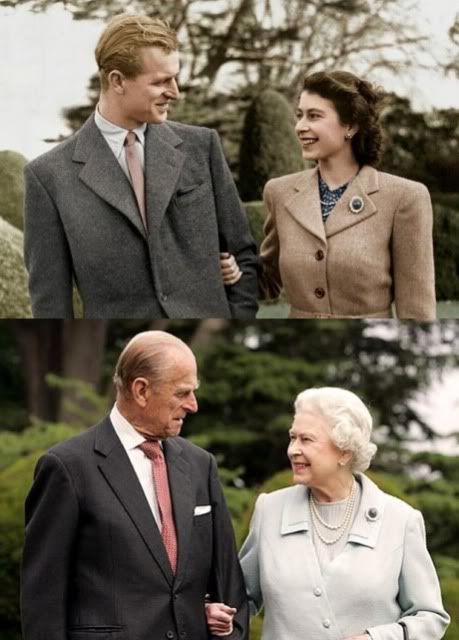
By all accounts Philip is a twat whose foot is perpetually in his mouth, but - I can’t help it. I think this is cute.
My original writing has slowed to a crawl. So has my fan-fiction. And this journal.
Basically, nothing’s gone terribly wrong, but nothing’s going right either. I feel like I’m on autopilot. I’m losing track of time. I have cabin fever. Send help.
Okay, enough with the whining.
Reading Log

Rise of a Hero by Hilari Bell
Ages ago I read the first book in this series The Fall of a Kingdom and wrote about it in this very LJ. I was hooked enough to seek out the sequel at the library, and I’m still enjoying it - yes, enough to get my hands on the last book in the trilogy. Set in a pseudo-historical Middle East (a rare setting for the fantasy genre) which has no magic, gods or other supernatural elements (even rarer) this is a story that chronicles the experiences of three young people when their lands are invaded by a large empire.
The beauty of the story lies in three distinct aspects:
1) The character development is fantastic, particularly for its three leads: Jiaan, Soraya and Kavi. Jiaan is the bastard son of a general killed in the previous books along with most of the rest of the ruling class, and thus finds himself the leader of the remnants of the army. I used the word “of” a lot in that sentence. On realizing that the empire has a strict policy of only waging war on another country for a year before calling a cease-fire and petitioning for peace, Jiaan attempts to aid the besieged city of Mazad and hinder the efforts of the Hrum invaders as they begin their occupation.
Then there’s Soraya, Jiaan’s half-sister who is legitimate and therefore has absolutely nothing in common with her brother besides their mutual love for their late father. Having been sent into temporary exile when the fighting begins, Soraya grows and matures among the desert-folk who teach her the closest thing that this trilogy has to magic: the ability to find the inner essence of things and work them to her advantage. Disguising herself as a slave-girl, she enters a Hrum camp with the intent to discover the location of her mother and baby brother.
Finally, there’s Kavi, a peasant boy who initially threw his lot in with the Hrum in order to revenge himself on the aristocrats who cost him the use of his right hand (and thus his livelihood) only to find that the cost of his integrity was too high. Now he seeks to save his soul by freeing the slaves of the Hrum and working against the invaders in secret - and naturally the life of a triple agent is a highly stressful one.
2) With that in mind, it should be clear to see that this story is not divided into a good and evil conflict. Though the Hrum are the invading force, they also purport to bring many advantages of their empire into the more feudal kingdom of Farsala, and the ruling deghans of the conquered country were for the most part cruel and autocratic. And yet, it’s their own lands that they’re trying to defend, and they have a very high sense of honour and duty. Naturally, there are benevolent and corrupt individuals on both sides and Kavi in particular, who straddles both, can see this for himself.
It’s always great to read books about the true nature of war: that there really are no victors or heroes; just ordinary people who are stumbling about in the attempt to do the right thing. All three protagonists grapple with understanding what it means to make moral decisions in a time of war, and the author shows a deft hand when it comes to making the reader question the protagonists’ decisions for themselves.
3) Hilari Bell has a wonderful writing style. It’s always difficult to describe style, partly because what works for one reader won’t work for another, and partly because...well, it’s just difficult to describe something that’s so unique. But to me at least, Bell nails that difficult balance that a writer should attain between description, action, dialogue, exposition and characterization. She knows what words to put where and why and make it all flow together really elegantly.
So, if you’re in search for a book, either to read for yourself or to give away to the recommended reading age of this series, then I guess I’m recommending it.

Titanic
I knew going into this miniseries that it had gotten a lukewarm reception, but I honestly didn’t find it so bad. That is, I had the requisite tears by the end, which along with some degree of historical accuracy, is really all you want from a Titanic adaptation, right?
That said, I’m not entirely sure that the format worked so well, nor the massive cast. Rather than tell the story in chronological order, each episode instead focuses on a particular family, taking us through the circumstances that bring them aboard Titanic and their initial activities on board, all the way up to the evacuation of the ship. Then it then ends on a cliff-hanger and starts all over again in the next episode, this time focusing on a new group of people. Each time, little sequences involving minor characters will be strewn throughout the main action, their meaning not becoming clear until the next episode sheds further light on their context. As such, it’s almost impossible to keep track of everyone and everything the first time around, and the lead-up to the sinking of the vessel seems incredibly rushed.
Likewise, Julian Fellowes (of Downton Abbey fame) mingles his own fictional characters with real-life figures that were on board at the time. Though this does create some suspense over who lives and who dies, it also betrays where Fellowes’s true interest lies: the class divide. If Downton Abbey has told us anything, it’s that Fellowes loves exploring the difference between the aristocracy, the servants, and all the different levels that lie in-between. As such, the show feels a bit disjointed: the first half of each episode is Downton Abbey...On A Ship! and the second half is rudely interrupted by that pesky iceberg. Suddenly the narrative comes to an abrupt halt as the boat begins to sink.
Yet there is great attention to detail when it comes to historical accuracy. I honestly had no idea about the inability of the crew to access the ship’s binoculars due to crewman David Blair’s dismissal right before the voyage (he took the key to the case with him), and there’s a largely successful attempt made to show the audience how a disaster like Titanic doesn’t just happen - it’s the result of a dozen or so little mistakes, leading to that one fateful night. That was the other thing: it occurred to me while watching this that were Titanic a work of fiction, it would be derided as too implausible. Just think of all the iconic elements that make this story so utterly unforgettable: that it was lauded as “unsinkable”, that it was the ship’s maiden voyage, that it collided with the iceberg just on midnight, that it's one of the deadliest peacetime maritime disasters in history - it’s a perfect storm, really.
So on the whole, I enjoyed the mini-series, even though I could never quite shake free of the sense that it was made to capitalize on the centennial of the ship’s sinking. Which of course, is precisely why it does exist.
Olympic Games 2012
In better news, the Olympic Games have come to a close, and New Zealand did pretty damn good, coming fifteenth overall and picking up thirteen medals: six gold, two silver and five bronze.
Here are some of our lovely winners:
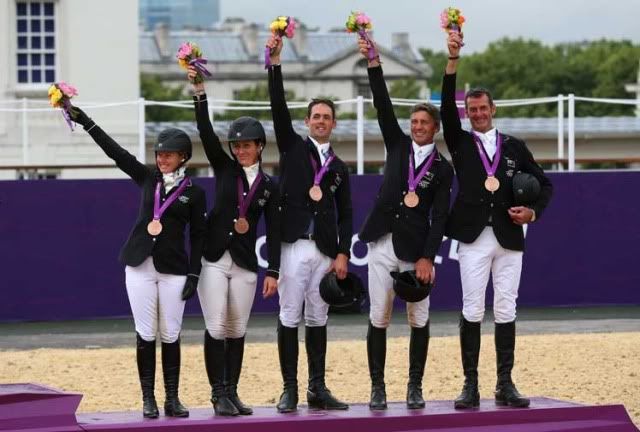
The equestrian team picked up bronze.
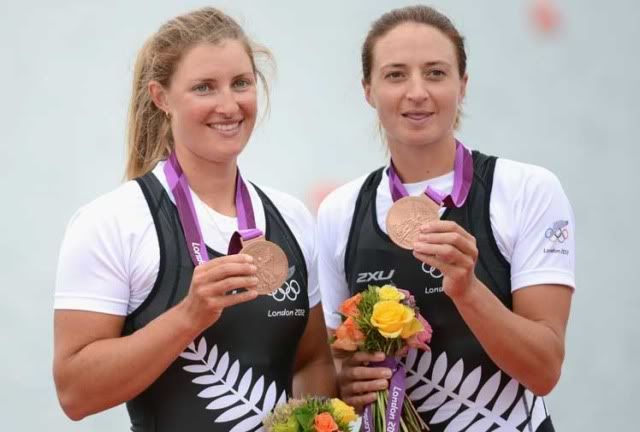
Rowers Juliette Haigh and Rebecca Scown get bronze.
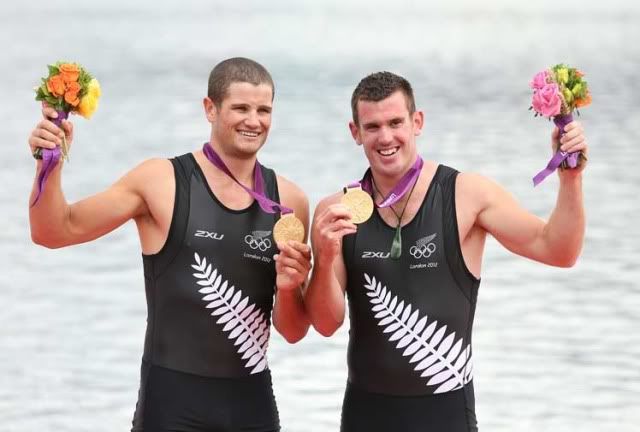
Double scullers Nathan Cohen and Joseph Sullivan get our first gold.
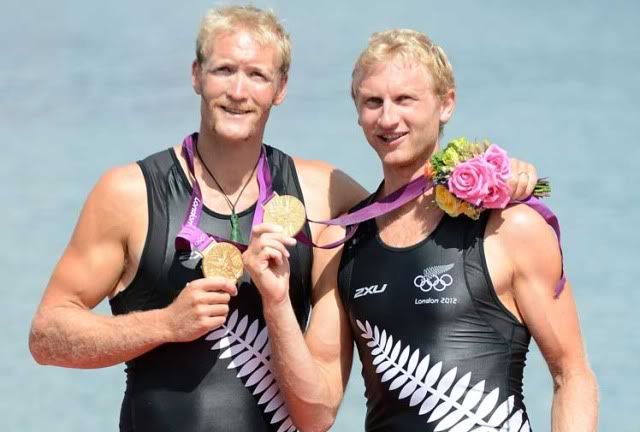
Eric Murray and Hamish Bond win the men’s pair rowing race.
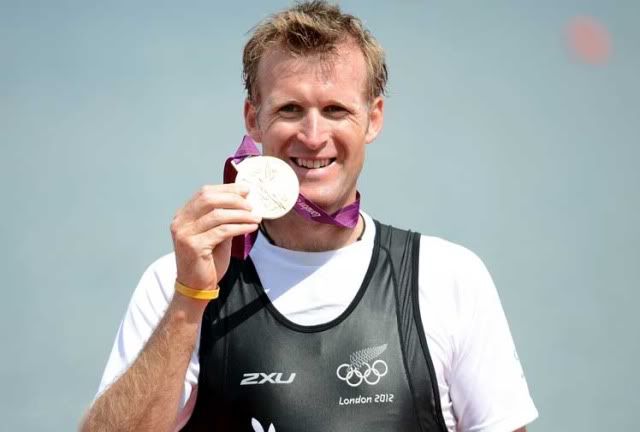
Single sculler Mahe Drysdale wins gold.

Cycling pursuit team takes out the bronze.
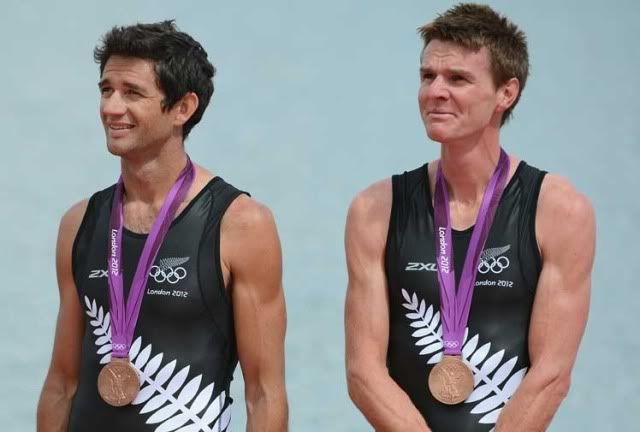
Storm Uru and Peter Taylor win bronze in the double sculls.
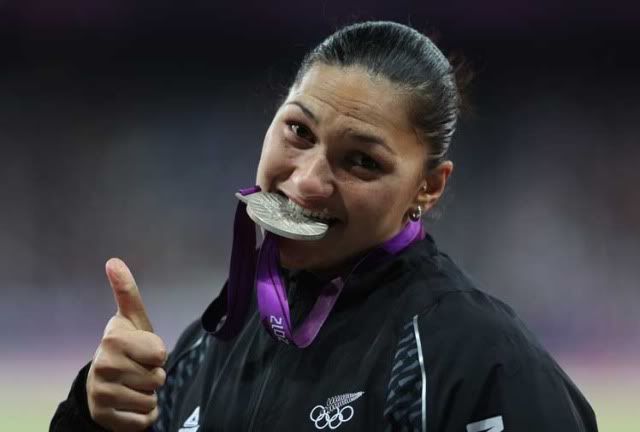
Now, this is the lovely Valerie Adams, here shown with her silver medal for shot-put, which would later be upgraded to gold when it was discovered that her competitor Nadzeya Ostapchuk tested positive for drug use. Naturally, we’re all feeling very disgruntled on Valerie’s behalf. Even though she’ll go down in the record books as the gold medallist, she was still robbed of her victory on the podium by someone who had cheated her way there. I seriously can’t understand those who not only deign to cheat their way to victory, but who think that they can get away with it.

Van Velthooven won bronze in the keirin, which in case you were wondering, is a motor-paced cycle racing in which track cyclists sprint for victory following a speed-controlled start behind a motorized or non-motorized pacer. It only became official event at the Olympics in Sydney, 2000. Thanks, Wikipedia!
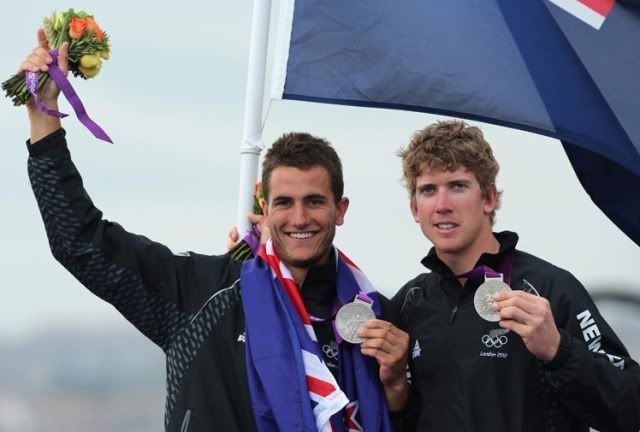
Blair Tuke and Peter Burling pick up silver in the 49er class, which also happened to be New Zealand’s 100th gold medal.
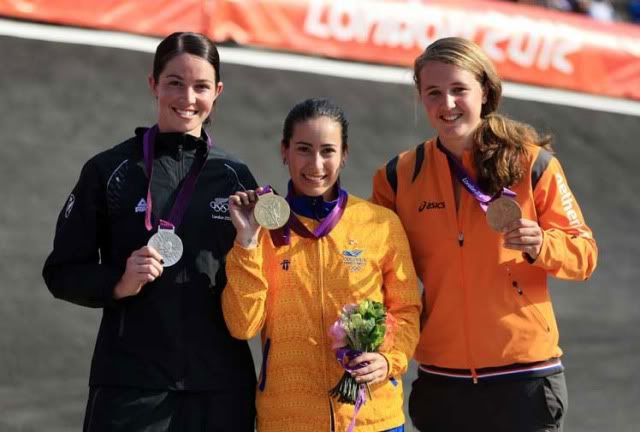
Sarah Walker won silver in the female BMX final.
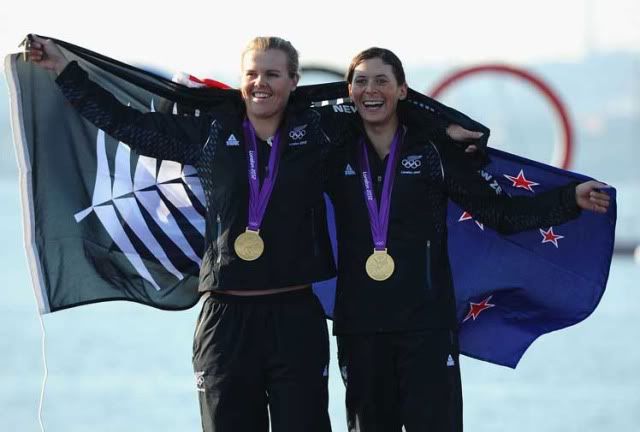
Jo Aleh and Olivia Powrie win gold in sailing.

And Lisa Carrington takes out gold in the K1 200m canoe sprint.

All our gold medallists! I salute you all, even though I have absolutely no interest whatsoever in sports of any kind. But despite that, I can well appreciate all the blood, sweat, tears and early mornings that go into the training required to take one of these medals home, and I want to pay tribute to them all. I’m certainly proud that New Zealand performed so well against countries that contain populations that are significantly larger than what is to be found on our little islands.
Depending on how you look at it, you could even say that we won the Olympics. No, really! Per head of population, New Zealand topped the gold medal table with 1.39 gold medals per million people. Jamaica came in a close second with 1.38 and Hungary third with 0.8.
However, if you take into account the total amount of medals won by each country, Jamaica wins with 4.14 medals per million people, New Zealand comes second with 3.0 and Hungary third with 1.7.
In any case, New Zealand only got one less gold medal than Australia, even though we have 18 million less people. But hey, who’s counting?
But there have been minor ups and relative downs in the past two weeks, nothing more noticeable than the nibbling of a goldfish (probably) feels, but here’s the run down...
The weather has been crappy and my sister has a new boyfriend which means she keeps going out in the car that we both share and leaving me stranded in our apartment for hours (days) on end.
My aunt moved to England and left me all her Doctor Who DVDs (yay) but series 5 has inexplicably gone missing (where?) so I’m holding up the discussion on the Yuku Boards (sorry).
Someone left THIS stupid comment on my Amazon.com review for Merlin series 4, complaining that Angel Coulby looked less like “a Genevieve” and more like “a Pocahontas.” What. The. Actual. Fuck.
In lieu of my Queen-centric watching habits a fortnight ago, I happened to chance upon this picture of Queen Elizabeth and Prince Philip.

By all accounts Philip is a twat whose foot is perpetually in his mouth, but - I can’t help it. I think this is cute.
My original writing has slowed to a crawl. So has my fan-fiction. And this journal.
Basically, nothing’s gone terribly wrong, but nothing’s going right either. I feel like I’m on autopilot. I’m losing track of time. I have cabin fever. Send help.
Okay, enough with the whining.
Reading Log

Rise of a Hero by Hilari Bell
Ages ago I read the first book in this series The Fall of a Kingdom and wrote about it in this very LJ. I was hooked enough to seek out the sequel at the library, and I’m still enjoying it - yes, enough to get my hands on the last book in the trilogy. Set in a pseudo-historical Middle East (a rare setting for the fantasy genre) which has no magic, gods or other supernatural elements (even rarer) this is a story that chronicles the experiences of three young people when their lands are invaded by a large empire.
The beauty of the story lies in three distinct aspects:
1) The character development is fantastic, particularly for its three leads: Jiaan, Soraya and Kavi. Jiaan is the bastard son of a general killed in the previous books along with most of the rest of the ruling class, and thus finds himself the leader of the remnants of the army. I used the word “of” a lot in that sentence. On realizing that the empire has a strict policy of only waging war on another country for a year before calling a cease-fire and petitioning for peace, Jiaan attempts to aid the besieged city of Mazad and hinder the efforts of the Hrum invaders as they begin their occupation.
Then there’s Soraya, Jiaan’s half-sister who is legitimate and therefore has absolutely nothing in common with her brother besides their mutual love for their late father. Having been sent into temporary exile when the fighting begins, Soraya grows and matures among the desert-folk who teach her the closest thing that this trilogy has to magic: the ability to find the inner essence of things and work them to her advantage. Disguising herself as a slave-girl, she enters a Hrum camp with the intent to discover the location of her mother and baby brother.
Finally, there’s Kavi, a peasant boy who initially threw his lot in with the Hrum in order to revenge himself on the aristocrats who cost him the use of his right hand (and thus his livelihood) only to find that the cost of his integrity was too high. Now he seeks to save his soul by freeing the slaves of the Hrum and working against the invaders in secret - and naturally the life of a triple agent is a highly stressful one.
2) With that in mind, it should be clear to see that this story is not divided into a good and evil conflict. Though the Hrum are the invading force, they also purport to bring many advantages of their empire into the more feudal kingdom of Farsala, and the ruling deghans of the conquered country were for the most part cruel and autocratic. And yet, it’s their own lands that they’re trying to defend, and they have a very high sense of honour and duty. Naturally, there are benevolent and corrupt individuals on both sides and Kavi in particular, who straddles both, can see this for himself.
It’s always great to read books about the true nature of war: that there really are no victors or heroes; just ordinary people who are stumbling about in the attempt to do the right thing. All three protagonists grapple with understanding what it means to make moral decisions in a time of war, and the author shows a deft hand when it comes to making the reader question the protagonists’ decisions for themselves.
3) Hilari Bell has a wonderful writing style. It’s always difficult to describe style, partly because what works for one reader won’t work for another, and partly because...well, it’s just difficult to describe something that’s so unique. But to me at least, Bell nails that difficult balance that a writer should attain between description, action, dialogue, exposition and characterization. She knows what words to put where and why and make it all flow together really elegantly.
So, if you’re in search for a book, either to read for yourself or to give away to the recommended reading age of this series, then I guess I’m recommending it.

Titanic
I knew going into this miniseries that it had gotten a lukewarm reception, but I honestly didn’t find it so bad. That is, I had the requisite tears by the end, which along with some degree of historical accuracy, is really all you want from a Titanic adaptation, right?
That said, I’m not entirely sure that the format worked so well, nor the massive cast. Rather than tell the story in chronological order, each episode instead focuses on a particular family, taking us through the circumstances that bring them aboard Titanic and their initial activities on board, all the way up to the evacuation of the ship. Then it then ends on a cliff-hanger and starts all over again in the next episode, this time focusing on a new group of people. Each time, little sequences involving minor characters will be strewn throughout the main action, their meaning not becoming clear until the next episode sheds further light on their context. As such, it’s almost impossible to keep track of everyone and everything the first time around, and the lead-up to the sinking of the vessel seems incredibly rushed.
Likewise, Julian Fellowes (of Downton Abbey fame) mingles his own fictional characters with real-life figures that were on board at the time. Though this does create some suspense over who lives and who dies, it also betrays where Fellowes’s true interest lies: the class divide. If Downton Abbey has told us anything, it’s that Fellowes loves exploring the difference between the aristocracy, the servants, and all the different levels that lie in-between. As such, the show feels a bit disjointed: the first half of each episode is Downton Abbey...On A Ship! and the second half is rudely interrupted by that pesky iceberg. Suddenly the narrative comes to an abrupt halt as the boat begins to sink.
Yet there is great attention to detail when it comes to historical accuracy. I honestly had no idea about the inability of the crew to access the ship’s binoculars due to crewman David Blair’s dismissal right before the voyage (he took the key to the case with him), and there’s a largely successful attempt made to show the audience how a disaster like Titanic doesn’t just happen - it’s the result of a dozen or so little mistakes, leading to that one fateful night. That was the other thing: it occurred to me while watching this that were Titanic a work of fiction, it would be derided as too implausible. Just think of all the iconic elements that make this story so utterly unforgettable: that it was lauded as “unsinkable”, that it was the ship’s maiden voyage, that it collided with the iceberg just on midnight, that it's one of the deadliest peacetime maritime disasters in history - it’s a perfect storm, really.
So on the whole, I enjoyed the mini-series, even though I could never quite shake free of the sense that it was made to capitalize on the centennial of the ship’s sinking. Which of course, is precisely why it does exist.
Olympic Games 2012
In better news, the Olympic Games have come to a close, and New Zealand did pretty damn good, coming fifteenth overall and picking up thirteen medals: six gold, two silver and five bronze.
Here are some of our lovely winners:

The equestrian team picked up bronze.

Rowers Juliette Haigh and Rebecca Scown get bronze.

Double scullers Nathan Cohen and Joseph Sullivan get our first gold.

Eric Murray and Hamish Bond win the men’s pair rowing race.

Single sculler Mahe Drysdale wins gold.

Cycling pursuit team takes out the bronze.

Storm Uru and Peter Taylor win bronze in the double sculls.

Now, this is the lovely Valerie Adams, here shown with her silver medal for shot-put, which would later be upgraded to gold when it was discovered that her competitor Nadzeya Ostapchuk tested positive for drug use. Naturally, we’re all feeling very disgruntled on Valerie’s behalf. Even though she’ll go down in the record books as the gold medallist, she was still robbed of her victory on the podium by someone who had cheated her way there. I seriously can’t understand those who not only deign to cheat their way to victory, but who think that they can get away with it.

Van Velthooven won bronze in the keirin, which in case you were wondering, is a motor-paced cycle racing in which track cyclists sprint for victory following a speed-controlled start behind a motorized or non-motorized pacer. It only became official event at the Olympics in Sydney, 2000. Thanks, Wikipedia!

Blair Tuke and Peter Burling pick up silver in the 49er class, which also happened to be New Zealand’s 100th gold medal.

Sarah Walker won silver in the female BMX final.

Jo Aleh and Olivia Powrie win gold in sailing.

And Lisa Carrington takes out gold in the K1 200m canoe sprint.

All our gold medallists! I salute you all, even though I have absolutely no interest whatsoever in sports of any kind. But despite that, I can well appreciate all the blood, sweat, tears and early mornings that go into the training required to take one of these medals home, and I want to pay tribute to them all. I’m certainly proud that New Zealand performed so well against countries that contain populations that are significantly larger than what is to be found on our little islands.
Depending on how you look at it, you could even say that we won the Olympics. No, really! Per head of population, New Zealand topped the gold medal table with 1.39 gold medals per million people. Jamaica came in a close second with 1.38 and Hungary third with 0.8.
However, if you take into account the total amount of medals won by each country, Jamaica wins with 4.14 medals per million people, New Zealand comes second with 3.0 and Hungary third with 1.7.
In any case, New Zealand only got one less gold medal than Australia, even though we have 18 million less people. But hey, who’s counting?